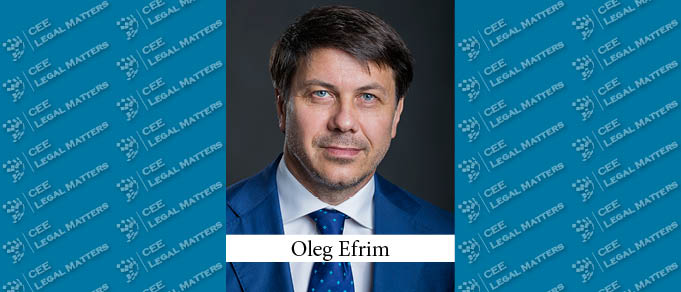Moldova's legal and economic landscape is undergoing momentous transformations according to Efrim Rosca Asociatii Partner Oleg Efrim, from updates to the corporate sector and an ongoing digital transformation, to Moldova's path towards EU integration and the challenges and opportunities facing various business sectors amid geopolitical tensions.
“The new amendments to the corporate laws are a pivotal step for Moldova, drawing inspiration from models in the EU (including the European Model Company Act) and Switzerland,” Efrim begins. “It streamlines various corporate matters, including the regulation of new institutions and liberalization and flexibility for shareholders' decision-making and shareholder agreements. This act is more than a legal update – it's a strategic alignment with Western standards, simplifying company operations and fostering a more business-friendly environment,” he explains.
To that same tune, Moldova is marching forward on its path toward the European Union, Efrim notes. “The commencement of accession talks is a monumental event for Moldova,” he says, indicating the European Commission recommendation of November 8, 2023. “It necessitates a thorough revision of our legislative frameworks to align with EU standards. This harmonization process will touch upon various sectors, ensuring that our laws not only comply with but also embrace European principles and practices,” he highlights.
As part of this transformation towards a more integrated tomorrow, Moldova is already tackling the public services sector. “The digital transformation is revolutionizing the way we interact with public services,” Efrim continues. “For the justice system, it means implementing pilot programs that enable lawyers to participate in sessions, such as hearings, completely remotely.” This digital shift extends to company registrations, obtaining permits, and interactions with public authorities. “It's a significant step towards modernizing our judiciary and making justice more accessible.”
Furthermore, Efrim reports that the Supreme Court of Justice of Moldova has undergone a thorough reform. “The Supreme Court's restructuring is a major step forward,” he says. “It's designed to streamline caseload management and the admissibility of appeals, thereby rationalizing workflow and optimizing court operations. This reform aims to enhance the efficiency and effectiveness of our highest court. Thus, the Supreme Court of Justice will have more limited powers and will not act as an appeals court, as it currently does.” Additionally, the hitherto existing state fee cap for filing cases into court will be removed on January 1, 2024, in a move that Efrim describes as bold. “This may potentially improve the quality of our judicial system. This change is expected to increase public awareness and usage of legal channels, fostering a more robust legal environment.”
Turning to the state of Moldova's business sectors, Efrim begins by mentioning that “the IT sector is paving the path forward. With local IT-specific zones that benefit from an advantageous flat 7% tax system, investors from all over the world are increasingly becoming aware of the benefits of doing business here.” Moreover, Efrim states that the IT sector has, “alongside banking, demonstrated noticeable resilience during the pandemic and is outperforming other industries.”
Finally, Efrim mentions the ramifications of the war in Ukraine. “The war has indeed put a strain on our infrastructure and transportation, with ripple effects spreading onto sectors like agriculture. Many industries are now heavily reliant on the quality of their management systems to navigate these logistical challenges,” he says. “The future trajectory of these sectors, amid these hardships, remains uncertain but is a critical area of focus for us.”















